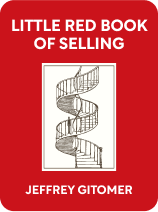

This article is an excerpt from the Shortform book guide to "Little Red Book of Selling" by Jeffrey Gitomer. Shortform has the world's best summaries and analyses of books you should be reading.
Like this article? Sign up for a free trial here .
Is it a good idea to use humor in sales? How can using humor help you close more deals?
Making people laugh relaxes them and creates an atmosphere conducive to buying. Plus, humor is engaging, that is it grabs prospects’ attention and imbues the interaction with positive emotions, which is a necessary ingredient of a successful sale.
In this article, we’ll discuss how to use humor in sales and some ways you can improve if humor isn’t your strong suit.
Why Use Humor in Sales?
Laughing together is a form of agreement or approval, and agreement is a step toward selling. Put another way, get people to laugh and you can get them to buy—all things being equal, customers will choose to buy from you over a humorless competitor. Besides helping you make the sale, humor also builds customer relationships by facilitating friendship and respect.
To improve your humor, study humor, especially if you aren’t naturally funny. Here are some ways to learn to be funnier:
- Pay attention to what happens to you so you can reference funny events in jokes.
- Visit comedy clubs or watch comedians on TV. Study delivery and audience reaction.
- Read joke books.
- Listen to children, who are naturally funny.
- Practice jokes with family and friends.
- Take an acting class.
- Join Toastmasters, a public speaking club.
- Practice making exaggerated faces and gestures.
- Laugh and smile more.
Err on the Side of Safety
When using humor in sales, stick to safe topics such as things kids say and do, traffic, lines from television shows, and things you see. In general, pick something that’s:
- Funny to you: Your joke will seem natural rather than forced.
- Personal: Poke fun at a personal quality or feature, but never make fun of others.
- Tested: Try your jokes on friends and family first to see if they work.
- Clean: Never make crude, ethnic, or gender jokes.
In addition to jokes, tell funny stories about yourself. Stories are authentic because they’re about real experiences, in contrast to jokes that sometimes sound contrived. They’re also self-effacing, engaging, and memorable. If a story prompts your conversational partner to tell a story in return, it’s helped you build rapport. Stories incorporated into a sales presentation may also help a prospect relate to your product.
Humor should be the last element you incorporate into your selling process (the icing on the cake)—after you’ve developed sales skills, become an expert in your product, and know your customer and her business. With the other factors in place, it can seal the deal.

———End of Preview———
Like what you just read? Read the rest of the world's best book summary and analysis of Jeffrey Gitomer's "Little Red Book of Selling" at Shortform .
Here's what you'll find in our full Little Red Book of Selling summary :
- Jeffrey Gitomer’s 13 principles of selling
- How to eliminate hurdles and win more sales
- The reasons why people buy even though they don't like being sold to






